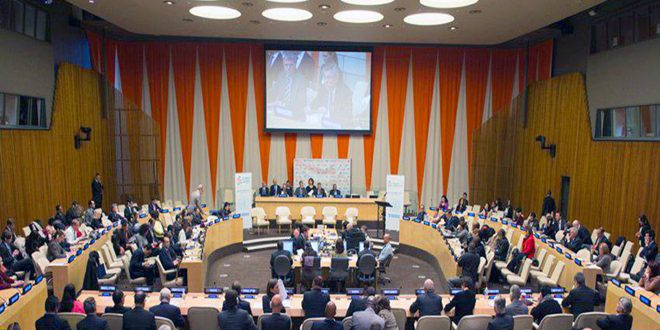ECOSOC reaffirms the right of Palestine and the Syrian Golan to their natural resources and calls on the Israeli occupation to stop exploiting these resources
The Economic and Social Council (ECOSOC) of the United Nations adopted the draft resolution entitled (The economic and social repercussions of the Israeli occupation on the living conditions of the Palestinian people in the Occupied Palestinian Territory, including Al-Quds [Jerusalem], and the people in the occupied Syrian Golan).
The report submitted by Cuba on behalf of the Group of 77 and China.
The adoption of the resolution came yesterday after conducting the voting that obtained the support of 39 countries, the opposition of the Israeli occupation entity, the United States, Canada and Liberia, and the abstention of 3 countries, namely the United Kingdom, Ivory Coast and Guatemala.
The resolution reaffirms the principle of the permanent sovereignty of peoples under foreign occupation over their natural resources, and in this regard the ECOSOC expresses its concern at the exploitation, endangerment and depletion of natural resources by (Israel) and Israeli settlers in the occupied Syrian Golan and the Occupied Palestinian territory, including East Al-Quds (Jerusalem).
The resolution notes that the Israeli occupation seriously impedes efforts to achieve environmentally sustainable development and create a sound economic environment in the occupied Syrian Golan and in the occupied Palestinian territories, and it expresses grave concern at the resulting deterioration in economic and living conditions.
The resolution also reaffirms the inalienable right of the people in the occupied Syrian Golan and the Palestinians to all their natural and economic resources. It demands (Israel) not to exploit these resources or endanger them or cause their loss or depletion and to immediately end their exploitation of natural resources.
In turn, the permanent delegation of the Syrian Arab Republic affirmed in its intervention that (Israel), the occupying power, continues to use policies and practices that contradict relevant Security Council resolutions, international humanitarian law and international human rights law.
The permanent delegation reaffirmed that the expansion of Israeli settlements and commercial activity and the construction of wind turbines in Golan have negative effects on the health of the Syrian citizens in that region, on the environment where they live and on the agricultural activities they carry out.
The delegation also denounced the occupation’s policy of putting pressure on Syrian farmers, through depriving them of irrigation water, forcing them to buy water at high prices, and through seizing land and natural resources in the Golan and through the expropriation of lands close to the cease-fire line with the aim of planting landmines.
The delegation also stressed the need to solve the problem from its roots through the immediate implementation of UN resolutions related to ending the long-term Israeli occupation.
Inas Abdulkareem

